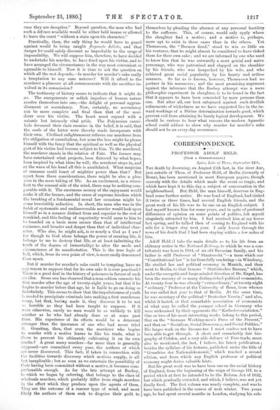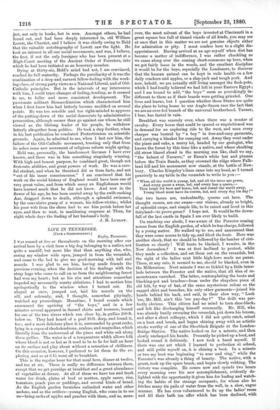CORRESPONDENCE.
PROFESSOR ADOLF HELD. [Filet( • CORRESPONDENT.]
Spiez, Lake of Thus, September 12th.
`NE death by drowning, on August 25th last, in the river Aar, just outside of Thun, of Professor Held, of Berlin (formerly of
Bonn), has been mentioned in most European papers, though scarcely with the details which made the event so tragic, and which have kept it to this day a subject of conversation in the neighbourhood. But Held, the man himself, deserves in Eng- land some further notice. He was fond of England, had visited it twice or three times, had several English friends, and the great work of his life was to be one on an English subject. I had myself known him for some years, and in spite of profound differences of opinion on some points of politics, felt myself singularly attracted by him. I had received hint at my house last spring, and he talked then of coming to England with his wife for a longer stay next year. I only learnt through the news of his death that I had been staying within a few miles of him.
Adolf Held (I take the main details as to his life from an obituary notice in the Arationcd Zeit any, to which he was a con- tributor) was born in 1844, of an old Bavarian family, and his father is still Professor of " Stautarecht "—a term which our " Constitutional law " is far from fully rendering—in Wurzburg. He studied law and political economy in Munich, and then went to Berlin, to that famous " Statistisches Bureau," which, under the energetic and large-minded direction of Dr. Engel, has been the nursery of so many distinguished political economists. At twenty-four he was already " extraordinary," at twenty-eight " ordinary," Professor at the University of Bonu, from whence he was called last year to that of Berlin. At the same time, he was secretary of the political " Deutscber Verein ;" and also, whilst it lasted, of that remarkable association of economists of what may be called the younger School in Germany who were nicknamed by their opponents the " Kathedersoziatisten." One or two of his most interesting works belong to this period, that on the " German Working-men's Press of the Present," and that on " Socialism, Social Democracy, and Social Politics." His larger work on the Income-tax I must confess not to have been able to get through. A short and remarkably fair bio- graphy of Cobden, and a very able defence of Free-trade, must also be mentioned, the last, I believe, his latest publication ; besides the syllabus of his lectures, published under the title of " Grundriss der Nationalokonomie," which reached a second edition, and from which any English professor of political economy might derive valuable hints. But his great work was to have been one on the social history of England, from the beginning of the reign of George III. to a period which at first he intended to be the Reform Act of 1832, but which gradually extended, and which, I believe, was not yet finally fixed. The first volume was nearly complete, and was to have been published in the course of next winter. Two years ago, he had spent several months in London, studying his sub-
ject, not only in books, but in men. Amongst others, he had found out, and had been deeply interested in, old William Lovett, the Chartist, and I believe it was chiefly owing to Held that the valuable autobiography of Lovett saw the light. He took an interest in all our social movements, and was, I believe, the first, if not the only foreigner who has been present at a High-Court meeting of the Ancient Order of Foresters, into which he had been initiated as an honorary member.
Dying at thirty-six, Held's mind had not, I am convinced, reached its full maturity. Perhaps the peculiarity of it was the combination of a deep and earnest fellow-feeling with the work- ing-class, of strong party views as a National Liberal, and of Old- Catholic principles. But in the intervals of my intercourse with him, I could trace changes of feeling, tending, as it seemed to me, to fuller and more consistent development. The passionate militant Bismarckianism which characterised him when I first knew him had latterly become modified on several points. He was too sensible and too right-minded to approve of the putting-down of the social democrats by administrative persecution, although sooner than go against one whom he still viewed as the lifelong leader of his people, he withdrew latterly altogether from politics. He took a step further, when in his last publication he combated Protectionism on scientific grounds. Again, he admitted to me, when I last saw him, the failure of the Old-Catholic movement, trusting only that from its ashes some new movement of religious reform might spring.
Held was, personally, the handsomest German I have ever known, and there was in him something singularly winning. With high and honest purpose, he combined great, though not first-rate, abilities, and great powers of work. He was a care- ful student, and when he theorised did so from facts, and not " out of his inner consciousness." I am convinced that his work on the social history of England would have been one of very great value, and from which many an Englishman would have learned much that he did not know. And now in the flower of his age, he has been carried away by the swift-rushing Aar, dragged down to death, although a splendid swimmer, by the convulsive grasp of a woman, his fellow-victim ; whilst his poor wife from the shore had to see him perish before her eyes, and then to wait, in maddening suspense at Thun, for eight whole days the finding of her husband's body.
J. M. LUDLOW.



































 Previous page
Previous page